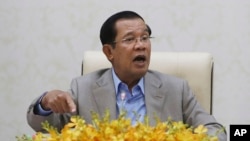Cambodia’s government has announced a crackdown on female online sellers who dress “too sexily,” prompting criticism from human rights organizations who say the move discriminates against women.
In a speech this week to the National Council for Women, Prime Minister Hun Sen said online sellers threaten Cambodian culture by exposing too much skin, and ordered police to go to their homes and educate them.
“Raid them,” he said, using an ambiguous term that could mean arrest. “This doesn’t violate their rights because they are causing the destruction of our Khmer culture.”
Amateur live videos posted on Facebook and other social media platforms feature women selling a range of goods, including accessories, makeup and clothing. Some sellers choose to wear outfits that reveal their cleavage.
Seven women’s rights organizations, including the Cambodian Center for Human Rights and ActionAid Cambodia, criticized the crackdown in an open letter published Wednesday. “It is important to note that social values are arbitrary, relative, and constantly changing. Also, there is no evidence-based research that affirms that women’s clothing choice is the root cause of degradation of social morality,” the letter reads.
Seng Reasey, an advocate at the women’s rights organization Silaka, also questioned the premier’s approach to culture.
“What culture are we referring to, and to what era?" she asked. "Under Apsara, for example, there was also nakedness. The next era also had nakedness. So what do you mean?"
“I don’t know why it’s only women who are said to destroy the whole culture… I think Khmer culture has much more beautiful things to offer. Why are we always just picking on women as destroying the culture?... If you preserve the culture that mainly imposes and restricts the freedom of one another, you have to ask whether you want that culture,” she said.
Hun Sen instructed relevant authorities, including the Ministry of Interior and the Ministry of Post and Telecommunications, to educate the women and take action should they continue to wear revealing clothes. “You sell your products, not your breasts,” he said.
Ministry of Interior spokesman Khieu Sopheak could not be reached for comment.
'Coerced moral education'
The international rights group Amnesty International slammed the government action. “The Prime Minister’s order to track down and ‘educate’ women represents a menacing application of the state’s surveillance apparatus to advance a discriminatory and patriarchal agenda. Facebook must refuse to cooperate with any discriminatory requests by the Cambodian authorities to block women’s profiles,” regional director Nicholas Bequelin said in a press release.
“The coerced moral ‘education’ of women by police is inherently arbitrary. None of these women have been accused of breaking any law, and the police appear to be acting solely on the basis of Hun Sen’s personal whim.”
The prime minister said that the clampdown is necessary as the revealing clothing would lead to sexual harassment and rape.
But the women’s rights activists rejected that argument. “Punishing women for their choice of clothing is therefore part of the root cause of violence, rather than its cure, and must be rejected,” their open letter said.
Reasey urged the government not to support victim-blaming. “It’s not about how women dress. ... The problem is the perpetrator, not the victim,” she said.
Two days after Hun Sen's announcement, online seller Thai Sreyneang apologized in a video posted to the National Police Facebook page and pledged to stop exposing her cleavage when selling products.
Chhon Navy, deputy director-general of the Information and Broadcasting General Department at the Ministry of Information, said the Ministry of Information and Culture should lay out criteria explaining what constituted “too sexy” wear. “They have Disciplinary and Praise Council to take action on all activities that impact tradition, culture, nationality and social ethics,” she said.
She said she did not know how many online sellers there were in Cambodia as they are not registered. But she said relevant authorities, such as the Ministry of Post and Telecommunications, would take "concrete action and find ways to tackle the problem.”
“First, contact them for educational measures and make a contract not to do that anymore. Second, if they still [go] Live we will cooperate with the relevant authority to take action,” she said, directing further questions to the Ministry of Post and Telecommunications.
Meas Pos, director of the ministry, said no concrete plan existed yet. “Now we have an internal meeting first, before we are going to do something with that. I think after tomorrow we will have the result,” he said.




